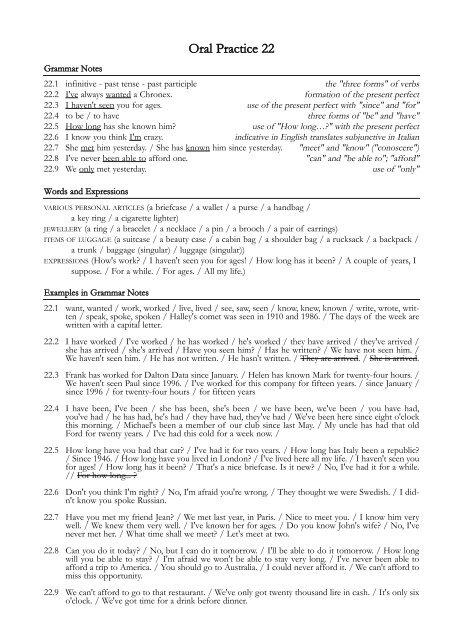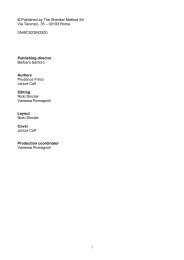O R A L P R A C T I C E Lessons 1 - 25 - Shenker
O R A L P R A C T I C E Lessons 1 - 25 - Shenker
O R A L P R A C T I C E Lessons 1 - 25 - Shenker
Create successful ePaper yourself
Turn your PDF publications into a flip-book with our unique Google optimized e-Paper software.
Grammar Notes<br />
22.1<br />
22.2<br />
22.3<br />
22.4<br />
22.5<br />
22.6<br />
22.7<br />
22.8<br />
22.9<br />
Words and Expressions<br />
VARIOUS PERSONAL ARTICLES (a briefcase / a wallet / a purse / a handbag /<br />
a key ring / a cigarette lighter)<br />
JEWELLERY (a ring / a bracelet / a necklace / a pin / a brooch / a pair of earrings)<br />
ITEMS OF LUGGAGE (a suitcase / a beauty case / a cabin bag / a shoulder bag / a rucksack / a backpack /<br />
a trunk / baggage (singular) / luggage (singular))<br />
EXPRESSIONS (How's work? / I haven't seen you for ages! / How long has it been? / A couple of years, I<br />
suppose. / For a while. / For ages. / All my life.)<br />
Examples in Grammar Notes<br />
22.1<br />
22.2<br />
22.3<br />
22.4<br />
22.5<br />
22.6<br />
22.7<br />
22.8<br />
22.9<br />
infinitive - past tense - past participle<br />
I've always wanted a Chronex.<br />
I haven't seen you for ages.<br />
to be / to have<br />
How long has she known him?<br />
I know you think I'm crazy.<br />
Oral Practice 22<br />
She met him yesterday. / She has known him since yesterday.<br />
I've never been able to afford one.<br />
We only met yesterday.<br />
the "three forms" of verbs<br />
formation of the present perfect<br />
use of the present perfect with "since" and "for"<br />
three forms of "be" and "have"<br />
use of "How long…?" with the present perfect<br />
indicative in English translates subjunctive in Italian<br />
"meet" and "know" ("conoscere")<br />
"can" and "be able to"; "afford"<br />
use of "only"<br />
want, wanted / work, worked / live, lived / see, saw, seen / know, knew, known / write, wrote, written<br />
/ speak, spoke, spoken / Halley's comet was seen in 1910 and 1986. / The days of the week are<br />
written with a capital letter.<br />
I have worked / I've worked / he has worked / he's worked / they have arrived / they've arrived /<br />
she has arrived / she's arrived / Have you seen him? / Has he written? / We have not seen him. /<br />
We haven't seen him. / He has not written. / He hasn't written. / They are arrived. / She is arrived.<br />
Frank has worked for Dalton Data since January. / Helen has known Mark for twenty-four hours. /<br />
We haven't seen Paul since 1996. / I've worked for this company for fifteen years. / since January /<br />
since 1996 / for twenty-four hours / for fifteen years<br />
I have been, I've been / she has been, she's been / we have been, we've been / you have had,<br />
you've had / he has had, he's had / they have had, they've had / We've been here since eight o'clock<br />
this morning. / Michael's been a member of our club since last May. / My uncle has had that old<br />
Ford for twenty years. / I've had this cold for a week now. /<br />
How long have you had that car? / I've had it for two years. / How long has Italy been a republic?<br />
/ Since 1946. / How long have you lived in London? / I've lived here all my life. / I haven't seen you<br />
for ages! / How long has it been? / That's a nice briefcase. Is it new? / No, I've had it for a while.<br />
// For how long... ?<br />
Don't you think I'm right? / No, I'm afraid you're wrong. / They thought we were Swedish. / I didn't<br />
know you spoke Russian.<br />
Have you met my friend Jean? / We met last year, in Paris. / Nice to meet you. / I know him very<br />
well. / We knew them very well. / I've known her for ages. / Do you know John's wife? / No, I've<br />
never met her. / What time shall we meet? / Let's meet at two.<br />
Can you do it today? / No, but I can do it tomorrow. / I'll be able to do it tomorrow. / How long<br />
will you be able to stay? / I'm afraid we won't be able to stay very long. / I've never been able to<br />
afford a trip to America. / You should go to Australia. / I could never afford it. / We can't afford to<br />
miss this opportunity.<br />
We can't afford to go to that restaurant. / We've only got twenty thousand lire in cash. / It's only six<br />
o'clock. / We've got time for a drink before dinner.



